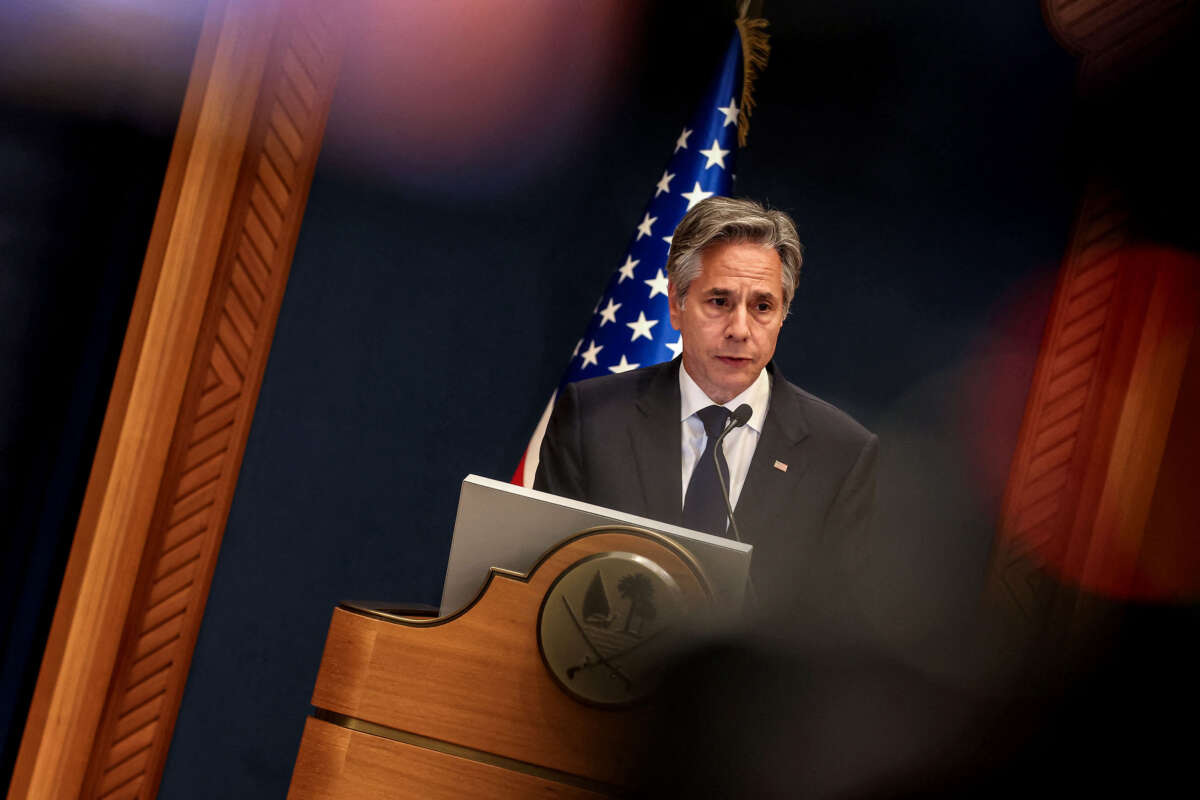Following the UN Security Council vote to approve a three-phase ceasefire in Gaza, U.S. officials and other international allies of Israel are cynically placing blame on Hamas for a stall in current ceasefire negotiations — even as Israel has insisted on indefinitely continuing its massacre in Gaza and Hamas has said its main request is a guarantee that Israel would actually honor the ceasefire.
On Wednesday, U.S. Secretary of State Antony Blinken said, without presenting further evidence, that Israel has agreed to the ceasefire and that Hamas leaders are posing a roadblock.
“Hamas could have answered with a single word: ‘yes,’” Blinken said, perhaps implying that Hamas is acting maliciously in having demands for what the U.S. has described as a ceasefire deal brought by Israeli officials.
But reports from a wide variety of news sources on how both Israel and Hamas are approaching the ceasefire proposal suggest that Blinken is lying about which party is accepting of the deal. Indeed, reports have found that it is actually Israel that won’t agree to the deal’s framework: an immediate ceasefire with a limited prisoner and hostage exchange, then a permanent ceasefire and withdrawal of Israeli troops from Gaza, and ultimately the reconstruction of Gaza and return of Palestinians to their homes.
Israel’s insistence on continuing its genocide has been consistent throughout the last eight months, including in reaction to the most recent ceasefire proposals of the past weeks. Officials have said Israel will only stop bombarding Gaza when they decide that Hamas has been eliminated and Palestinians there no longer pose a threat to Israel — a pledge that requires the mass slaughter of Palestinian civilians, as military procedures and Israel’s own public statements have shown.
On the other hand, Hamas and Palestinian Islamic Jihad announced on Tuesday in a joint statement that officials are ready to “deal positively to arrive at an agreement” on the ceasefire and want hostilities to come to a “complete stop.”
U.S. officials have been vague about what terms Hamas officials have brought to the negotiation — though White House National Security Adviser Jake Sullivan said Wednesday that “many” of their proposals are “minor and not unanticipated,” along with others that “differ more substantively” from the UN resolution.
But the main demand from Hamas appears to be straightforward, according to other officials familiar with the negotiations. Multiple outlets citing such sources have echoed what Hamas officials have said: that they are primarily concerned with getting guarantees from the U.S. and Israel that the deal will actually lead to a ceasefire and withdrawal from Gaza.
Specifically, Hamas is concerned about a lack of assurances from the current proposal about the transition between the first and second phases of the plan, Reuters reports, citing multiple sources involved with the talks. The first phase involves a six-week ceasefire, with the release of some Israeli hostages, while the second phase calls for a permanent ceasefire and Israeli troop withdrawal.
Further underscoring Hamas’s seeming openness to the deal, in the same press conference that Blinken blamed Hamas for the stall, Qatar’s foreign affairs minister said that the major difference between Israel’s and Hamas’s demands is that Hamas wants a permanent ceasefire, and Israel wants its hostages released while still being allowed to continue its massacre.
Trump is silencing political dissent. We appeal for your support.
Progressive nonprofits are the latest target caught in Trump’s crosshairs. With the aim of eliminating political opposition, Trump and his sycophants are working to curb government funding, constrain private foundations, and even cut tax-exempt status from organizations he dislikes.
We’re concerned, because Truthout is not immune to such bad-faith attacks.
We can only resist Trump’s attacks by cultivating a strong base of support. The right-wing mediasphere is funded comfortably by billionaire owners and venture capitalist philanthropists. At Truthout, we have you.
Truthout has launched a fundraiser, and we have only 48 hours left to raise $21,000. Please take a meaningful action in the fight against authoritarianism: make a one-time or monthly donation to Truthout. If you have the means, please dig deep.
